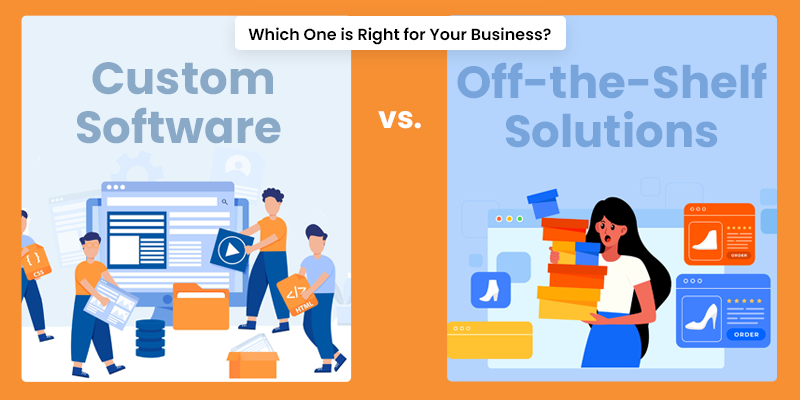Custom Software vs. Off-the-Shelf Solutions: Which One is Right for Your Business?
This blog will help you understand the key differences, advantages, and disadvantages of both options so you can make an informed decision.
What is Custom Software?
Advantages of Custom Software:
- Personalized to Your Needs:
- Custom software is designed exclusively for your business, ensuring that it aligns perfectly with your processes and goals.
- Scalability & Flexibility:
- As your business grows, custom software can be easily modified, upgraded, or expanded without compatibility issues.
- Better Security:
- Since it’s designed only for your company, custom software is less vulnerable to external threats compared to widely used off-the-shelf solutions.
- Competitive Advantage:
- A unique software solution can provide better efficiency, automation, and decision-making, giving you a competitive edge in the market.
- Seamless Integration:
- Custom software can be integrated with your existing tools and applications, reducing manual work and improving efficiency.
Disadvantages of Custom Software:
- Higher Upfront Cost:
- Developing custom software requires a significant initial investment in planning, development, and testing.
- Longer Development Time:
- Custom software development takes time, as it involves requirements gathering, prototyping, coding, testing, and deployment.
- Ongoing Maintenance:
- You’ll need regular updates and technical support to keep the software functional and up-to-date.
What is Off-the-Shelf Software?
Advantages of Off-the-Shelf Software:
- Lower Cost & Faster Implementation:
- Since it’s pre-built, off-the-shelf software is significantly cheaper and can be deployed immediately.
- Regular Updates & Support:
- Most commercial software comes with automatic updates, security patches, and customer support.
- Proven Reliability:
- Off-the-shelf solutions have been tested and used by multiple businesses, ensuring stability and performance.
- Easy Adoption & Training:
- Employees are more likely to be familiar with popular software, reducing the learning curve and training costs.
Disadvantages of Off-the-Shelf Software:
- Limited Customization:
- These solutions are designed for mass use, meaning they may not fully align with your specific business needs.
- Scalability Issues:
- If your business expands, you may outgrow the software’s capabilities, requiring additional integrations or an entirely new solution.
- Security Risks:
- Since off-the-shelf software is widely used, it is a prime target for cyberattacks and data breaches.
- Ongoing Licensing Costs:
- Many commercial solutions require monthly or annual subscription fees, which can add up over time.
Custom Software vs. Off-the-Shelf Solutions: Key Differences
Feature | Custom Software | Off-the-Shelf Software |
Cost | Higher upfront cost, but long-term savings | Lower initial cost, but ongoing licensing fees |
Customization | Fully tailored to your needs | Limited customization options |
Scalability | Easily scalable as business grows | May require additional integrations or upgrades |
Security | More secure with fewer external vulnerabilities | Higher security risks due to widespread usage |
Integration | Seamless integration with existing tools | May require third-party integrations |
Time to Implement | Longer development time | Immediate deployment |
Which One Is Right for Your Business?
Choose Custom Software If:
- Your business requires unique features and deep customization.
- You need a scalable solution that grows with your business.
- Security and data protection are a high priority.
- You want to reduce long-term software dependency.
Choose Off-the-Shelf Software If:
- You need a cost-effective and quick solution.
- Your business processes align with existing software functionalities.
- You prefer automatic updates and vendor support.
- You are comfortable adapting your workflows to fit the software.
Final Verdict: Custom or Off-the-Shelf?
- Small businesses & startups often opt for off-the-shelf software due to cost and ease of use.
- Mid-sized & enterprise businesses tend to invest in custom solutions for better flexibility and long-term benefits.

